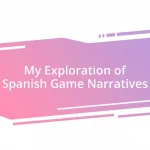Key takeaways:
- Folklore enhances gaming by connecting players to cultural heritage and enriching narratives, creating emotional depth and personal engagement.
- Popular themes such as the hero’s journey, nature and rebirth, and moral dilemmas resonate deeply, encouraging players to reflect on their own life experiences.
- Future trends in gaming include integrating lesser-known folklore and addressing contemporary issues, while advancements in technology may enhance immersive storytelling through virtual and augmented reality.

Overview of folklore in gaming
Folklore in gaming serves as a bridge between ancient stories and modern storytelling. Think about the rich tapestry of myths and legends that inform the narrative of a game—like how “The Legend of Zelda” weaves elements from various cultures into its quests. I often find myself engrossed in these narratives, wondering how a simple game can evoke such powerful feelings of nostalgia and curiosity.
Many games draw on folklore to create immersive worlds that resonate with players on a deeper level. For example, “Okami,” where you play as a sun goddess, not only introduces Japanese folklore but invites players to explore themes of rebirth and nature. Each encounter with a character feels like stepping into a story my grandmother might have told me, which can evoke both nostalgia and an appreciation for cultural heritage.
What’s fascinating is how different cultures’ folklore can lead to unique gameplay mechanics. In “God of War,” the adaptation of Norse mythology shapes not just the narrative but the very essence of combat and exploration. As I battle mythological creatures, I can’t help but ask myself: How do these age-old stories still manage to engage and inspire us today? It’s a testament to the power of storytelling, connecting us across generations.

Importance of folklore themes
Folklore themes in gaming hold immense significance as they resonate with players, offering a sense of connection to cultural heritage. When I play games like “Hollow Knight,” where each character draws from various mythological sources, I can’t help but feel a deep appreciation for the stories behind these creations. The narratives transform a mere digital experience into a tapestry of emotions, evoking nostalgia and wonder.
Moreover, these themes enrich gameplay by embedding them within the lore and mechanics, driving player engagement. I vividly remember the first time I encountered a folkloric spirit in “Spiritfarer.” The emotional weight behind the character’s backstory illuminated themes of loss and companionship, adding layers to what could have been a simple adventure game. This intertwining of narrative and gameplay made me reflect on my own life experiences, evoking a personal connection that lingers long after I’ve put down the controller.
Ultimately, folklore weaves a sense of authenticity into the gaming landscape, providing a framework of familiarity for players. It offers not just entertainment but a reflective experience. I find myself pondering how these ancient tales, so rich in wisdom, continue to shape our modern understanding of storytelling. They invite us to explore not just the gameplay, but ourselves in the process.
| Aspect | Importance |
|---|---|
| Cultural Connection | Bridges generational gaps, engages players with the roots of their heritage. |
| Emotional Depth | Enriches narratives, leading to a more profound, personal player experience. |
| Gameplay Mechanics | Informs game design choices, enhancing overall engagement through thematic consistency. |

Popular folklore themes in games
Popular folklore themes in games captivate players by weaving rich narratives with cultural significance. One theme I absolutely adore is the hero’s journey, often found in stories like “The Legend of Zelda: Breath of the Wild.” As I guide Link through Hyrule, I feel that familiar thrill of adventure reminiscent of classic folklore where ordinary individuals embark on extraordinary quests. There’s something deeply rewarding about discovering ancient relics or battling mythical creatures that echoes the tales my parents and grandparents shared with me.
Here are some of the most popular folklore themes that I’ve noticed in gaming:
- Hero’s Journey: Characters embarking on epic quests that reflect personal growth and transformation.
- Nature and Rebirth: Themes focusing on nature’s cycles and the concept of renewal, as seen in games like “Okami.”
- Trickster Figures: Characters that blend cunning and humor, such as Loki in “God of War,” which adds layers of unpredictability to the narrative.
- Spirituality and Ancestors: Many games explore connections to ancestors and spiritual forces, often enriching the storyline and gameplay, as in “Spiritfarer.”
- Moral Dilemmas: Folklore often presents ethical choices, encouraging players to reflect on their own values, a theme that resonates in various indie games.
Each of these themes resonates with me, not just as entertaining gameplay elements but as profound explorations of the human experience. I often find myself drawn into the worlds of these games, where every character feels like a piece of folklore brought to life. It’s exhilarating to feel that connection—to see how age-old stories can still speak to us today in a language we understand and relate to.

Examples of games with folklore
Some remarkable games intricately weave folklore into their narratives, enriching the player experience. Take “The Witcher 3: Wild Hunt,” for instance. Drawing from Slavic myth, its monsters and tales draw me in, making me feel as if I’m walking through the very stories my grandparents used to recount by the fire. Each creature, from the terrifying strzyga to the mischievous leshy, creates an atmosphere that’s both familiar and fantastically eerie, connecting me to a deeper cultural lineage with every quest I undertake.
In “Okami,” I find an enchanting fusion of Japanese folklore and art. As I guide Amaterasu, the sun goddess, through a world inspired by ancient legends, I feel a sense of wonder wash over me. The brushstroke mechanics are not just gameplay features; they symbolize themes of renewal and creation. This transcends the typical gaming experience, encouraging me to appreciate the beauty of nature and its intrinsic cycles—so reflective of what I’ve often contemplated in my life.
Then there’s “Ghost of Tsushima,” a game that immerses players in the lore of feudal Japan. I remember the first time I encountered the myth of the Kappa—small, water-dwelling creatures that echo the whimsical yet cautionary tales from my childhood. The game’s portrayal of these folklore figures adds a layer of authenticity that resonates with me personally. What I appreciate most is how these stories challenge me to think about courage and honor, illuminating moral dilemmas in engaging ways that encourage introspection. Isn’t it fascinating how folklore shapes our understanding of bravery and compassion?

Future trends in folklore themes
As I look towards the future of gaming, I see a growing trend towards integrating lesser-known folklore from various cultures. This diversification opens up a treasure trove of stories and characters waiting to be discovered. Imagine playing a game that introduces you to the rich tapestry of South American legends or the intricate mythologies of Indigenous peoples. It’s exciting to think about how these narratives can reshape our understanding of different cultures while providing players with unique experiences.
Another trend I find compelling is the blending of folklore with modern issues, creating games that address contemporary social themes through a folkloric lens. For instance, I envision a game where mythical beings embody real-world struggles like climate change or societal inequality, guiding players to reflect on their actions and choices. It’s a fascinating intersection of gaming and storytelling that can ignite meaningful discussions among gamers, allowing us to confront hard truths while enjoying immersive gameplay.
Lastly, the rise of virtual and augmented reality tech is bound to transform how we experience folklore in gaming. Picture yourself stepping into a digital realm where you can interact with legendary figures, experiencing tales as if they were unfolding around you. I can’t help but wonder: how will this level of immersion enhance our connection to these stories? My guess is that it will create deeper emotional responses and a more profound appreciation for the cultural significance behind them, bridging the gap between player and legend.














